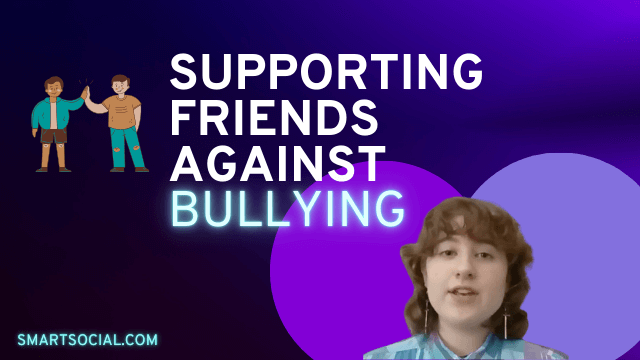打击网络霸凌:支持在校园和家中学的积极极端极端行为为
This is a
Green Zone App
(Click here to learn more)
Green Zone App
(Click here to learn more)
This is a
Dangerous Social media challenge
(Click here to learn more)
Dangerous Social media challenge
(Click here to learn more)
This is a
Red Zone App
(Click here to learn more)
Red Zone App
(Click here to learn more)
This is a
Gray Zone App
(Click here to learn more)
Gray Zone App
(Click here to learn more)
网络欺凌已成为当今学生心理健康和安全面临的最严重威胁之一。与传统的欺凌行为不同,它不会在学校结束时停止;它会通过手机、游戏平台和社交媒体提要跟踪学生回家。仅一条帖子、消息或图片就会不公平地损害学生的声誉,削弱他们的信心,并影响他们的健康。了解网络欺凌的真实面貌,它与其他在线分歧有何不同,以及家长和教育工作者如何应对是预防的第一步。本指南将帮助家长识别标志,为苦苦挣扎的学生提供支持,并创造更安全的数字空间,让善良而不是残酷的蓬勃发展。
完整活动回放(家长视频)
什么是网络欺凌?
- 网络欺凌是指有人通过社交媒体、短信、游戏或其他在线平台故意反复在网上伤害或骚扰某人
- 通常存在力量失衡,可能是身体的、社交的或智力的
- 网络欺凌有伤害意图,这意味着这不是意外犯罪
- 真正的欺凌行为仍在继续,不是一次性事件
- 58% 的初中和高中生亲身经历过网络欺凌(来源: cybullying.org)
什么不被视为欺凌?
- 意外伤害: 当有人在走廊或运动时不小心碰到你时,并不总是欺凌。欺凌涉及故意伤害
- 单一分歧: 与同学的一次性争论或分歧(在线或面对面),即使是激烈的争论或分歧,也不构成欺凌行为。欺凌是重复的和有针对性的
- 未被选入队伍,也没有看到你未参与的赛事的照片: 因为你没有被选入团队或小组活动而感到被排斥在外并不总是欺凌行为。欺凌是指反复和故意排斥
- 在朋友之间开玩笑: 朋友之间的粗心笑话(在线或离线)最终会造成伤害但并非如此,通常不构成欺凌。欺凌是指造成伤害、痛苦或恐惧
- 不分享利益: 不想和你一起出去玩的朋友并不总是欺凌。欺凌涉及蓄意和反复的敌对行为
- 人们不理你: 有时你的朋友会经历很多事情,无法在网上回复你。他们可能会遇到你不知道的挣扎
网络欺凌与面对面欺凌
- 无情且不可避免: 网络欺凌可以全天候发生,这使得受害者即使在家中也无法找到安全的空间
- 匿名: 网络欺凌者可以躲在匿名姓名和虚假个人资料后面,这会鼓励更具攻击性的行为
- 广大受众/病毒式传播: 图片、视频和信息可能会传播开来,吸引大量受众,并增加羞辱感
- 永久的数字足迹:即使帖子被删除,破坏性的帖子、消息和图片也会留下持久的记录,从而影响学生的未来
网络恶霸会发送哪些类型的消息?
- 侮辱或点名 -包含旨在贬低或羞辱个人的贬损性语言的消息
- 公开羞辱 -旨在在社交媒体平台等公共在线空间中使个人感到尴尬或羞辱的消息,包括发送令人尴尬的、敏感的或私人的信息
- 威胁 -包含威胁伤害或恐吓的消息,企图向受害者灌输恐惧
- 操纵 -试图控制或强迫个人违背其意愿做某事的消息
- 骚扰 -一连串可能具有攻击性、居高临下或令人反感的不想要的消息
- 身份盗窃 -假装自己是受害者的同时发送消息,通常是为了破坏他们的声誉或人际关系
网络欺凌的影响是什么?
- 心理健康: 网络欺凌与抑郁、焦虑和自尊心下降的风险增加密切相关
- 社交困境: 网络欺凌的受害者报告了社交疏离、孤立、情绪困扰以及对他们过去喜欢的活动缺乏兴趣
- 学业表现: 受欺负的学生的学习重心、参与度和出勤率可能会下降;有些学生甚至可能辍学
- 身体健康: 网络欺凌可能表现为头痛、睡眠不足、饮食改变、疾病和幸福感下降
- 行为变化: 参与网络欺凌的学生可能会产生攻击性、情绪波动、愤怒、成瘾或危险行为
- 自杀风险: 被欺负的孩子举报自杀念头和自残的可能性要高4倍
为什么孩子会欺负?
- 接触具有攻击性或暴力行为的成年人或影响力
- 感觉失控了。他们通过控制他人来寻求权力
- 屈服于同伴压力,要求获得社会认可和地位
- 感到不安全或自尊心很低
- 缺乏同理心、情绪调节或理解力
- 他们自己可能是同伴欺凌的受害者
如何避免成为网络欺凌的受害者?
- 保护您的个人信息 -不要让在线欺凌者轻易瞄准你。将您的密码和联系信息保密
- 发帖前要三思 -除非你对所有人都能看到它感到满意,否则不要在网上发布任何内容
- 明智地选择你的朋友 -仅接受您信任和亲自认识的人发出的好友/关注请求。屏蔽任何对你持负面看法的人
- 建立良好的在线边界 -决定你想如何被对待,并在跨越界限时大声说出来,这样事情就不会升级
- 专注于自信 -表现出自信通常会吓跑恶霸,但它也可以帮助你从原本会让你失望的情况中恢复过来
如果你看到网络欺凌(或经历过网络欺凌)该怎么办
- 与值得信赖的成年人讨论在线互动 -营造一个让学生可以谈论他们与家长或老师的在线互动的环境,这样他们就不会感到孤单
- 不要回应或报复- 如果学生成为攻击目标,建议他们不要做出回应或进行报复,因为这通常会使情况变得更糟
- 定期检查和清理个人资料 -让学生定期查看他们的在线个人资料,并删除任何可能使他们成为目标的内容
- 成为一个挺身而出的人,而不是旁观者 -鼓励学生支持在网上受到欺凌的同龄人,并向成年人举报
- 保存证据 -鼓励学生保存任何欺凌信息或截取任何欺凌行为的屏幕截图,以备他们需要举报
- 使用报告功能 -教导学生如何使用社交网络和在线平台上的举报功能来举报网络欺凌
- 知道何时断开连接 -鼓励学生在社交媒体上休息一下,如果他们对在线互动感到不知所措,则断开与设备的连接
围绕网络欺凌的对话入门
- “如果有人在网上对你或其他人说过一些刻薄的话,你会愿意告诉我吗?我想让你知道我是来帮忙的,而不是评判的。”
- “我注意到你最近似乎更加孤单,在使用手机/电脑后心烦意乱。你想谈谈在线上发生的事情吗?”
- “我听过关于孩子们为卑鄙的在线行为而苦苦挣扎的故事——无论是在接收端,有时还是在参与其中。如果你发现自己处于困境,要知道我们可以一起解决这个问题。”
- “如果在线情况让你感到不舒服,你足够信任的成年人或朋友是谁?
- “如果你看到有人在网上受到欺凌,有哪些安全的应对方式?”
- “你有没有因为在网上对你说的话而感到欺负或不舒服?”
迹象表明你的学生在网上被欺负
如果你发现学生的习惯发生了变化,那么这可能表明你的孩子在网上受到欺凌。
- 改变饮食习惯
- 睡眠时间超过正常水平或少于正常水平
- 学术变革
- 表现出攻击性或激动加剧的迹象
- 改变习惯
- 对他们曾经喜欢的活动失去兴趣
- 设备使用量的增加或减少
- 退出了,不想说话
家长干预步骤
- 和你的孩子说话 -就正在发生的事情以及您的孩子认为最好的解决方案进行开放和支持性的对话
- 记录欺凌行为 -记录事件,包括日期、时间和描述
- 联系学校 -与教师和管理人员合作解决这个问题
- 专业支持 -如果你的孩子在情感上挣扎,可以考虑向辅导员或心理学家寻求帮助
- 法律建议 -在严重的情况下,如果欺凌行为包括非法活动,例如人身攻击或分享裸照,则可能需要法律咨询
- 赋予孩子权力 -与您的孩子一起制定应对欺凌行为的策略,增强他们的信心和适应力
为处理网络欺凌的学生提供支持服务
- 全国预防自杀生命线危机聊天: https://988lifeline.org/chat/
- 立即停止欺凌热线:1-800-273-8255
- No Bully 帮助热线:1-866-488-7386
- LGBT 全国青年热线:1-800-246-7743
为家长、学生和教育工作者提供更多资源
结论
网络欺凌是一个严重的问题,影响着当今许多学生的生活。认识网络欺凌者使用的策略并清楚地了解如何支持遭受在线欺凌的学生至关重要。家长和教育工作者需要保持与学生的沟通渠道畅通,以支持他们并帮助他们以健康的方式应对欺凌。网络欺凌是一个持续存在的问题。这将需要警惕、同理心和集体努力来创建更安全的在线空间。
Protect your family and enter for a chance to win cool prizes
Join our next live online events to keep your family safe and be entered for a chance to win an Amazon Kindle, Bluetooth speaker or 3d printer each week!
学区:申请合作伙伴关系 在这个页面上 为您的整个社区解锁我们的资源。
成为会员或登录以了解有关此主题的更多信息
主管、董事和校长:申请合作伙伴关系 在这个页面上 为您的整个社区解锁我们的资源。
Protect your family and enter for a chance to win cool prizes
Join our next live online events to keep your family safe and be entered for a chance to win an Amazon Kindle, Bluetooth speaker or 3d printer each week!

。,开始从这个页面学习,赚取星巴克礼品卡的积分!**
你好,我是 SmartSocial.com 的创始人乔什。
在你填写我们的反馈表之前,不要离开这个页面,该反馈表将在你从资源中学习后出现...

加入我们的 聪明 社交播客
每周在 iTunes 上
Josh Ochs 共有 240 多集,采访了心理学家、治疗师、辅导员、教师和家长,同时向你展示了如何利用社交媒体,有朝一日能在网上大放异彩。
听着:







.jpg)
.jpg)

.jpg)



